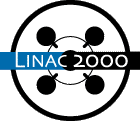
Pascal Balleyguier (CEA Bruyeres-le-Chatel), Ulrich Becker (CST Darmstadt)
In 1997, a cold model of a so-called optimized proton accelerating structure was measured. It turned out that predictions of RF losses in the region of coupling slots had been dramatically under-estimated by the simulation codes [1]. Since that time, a study made on the IPHI RFQ pumping holes showed that the problem occurred when a surface current line runs along a sharp re-entrant corner. This suggested a new way to compute losses and lead to an improvement in the MAFIA post-processor. We tested this new tool on the Trispal cavity geometry: the Q-drop caused by coupling slots is now very close to experimental values.
[1] P.Balleyguier, 'Coupling Slots Measurements Against Simulation For Trispal Accelerating Cavities', Proc. Linac Conference, Chicago, 1998.
Comments or Questions to
linac2000@slac.stanford.edu